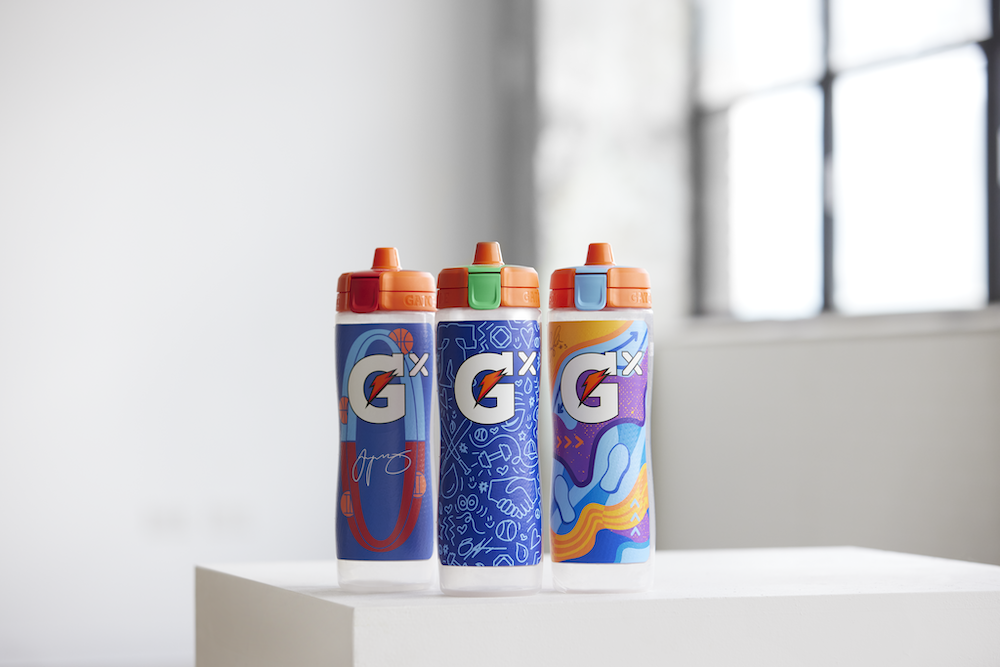
Gatorade engages millions of youth athletes each year through its field intelligence program, according to Chief Brand Officer Anju Bhasin, which it uses to mine for data and gather insights to evolve the business. The wealth of data it’s accrued on Gen Z has revealed a shift in how these consumers perceive and interact with such sports brands.
“Gen Z athletes are seeking a lot more from a sports brand that they might consume, like Gatorade, beyond the sport of play,” Bhasin told Chief Marketer. “They’re asking us for more products to help fuel them, to be a part of their life outside of a performance occasion. And they’re really interested in wellness and totality in mind and body, but also how it might help their athletic outcome.”
We spoke with Bhasin about the brand’s marketing approach toward Gen Z; upgrades to products, personalization and customization; efforts to build partnerships with endemic sport brands; its evolving influencer marketing strategy; and consumer collaboration to come in 2024.
Chief Marketer: How do you use data to inform your Gen Z marketing strategy?

Anju Bhasin, Chief Brand Officer at Gatorade: We engage almost five million youth athletes a year. We have a field intelligence program that we use to mine for data. And then we’re also overlaying a number of other models and panels we put in place with Gen Z athletes to understand what’s relevant to them, what’s happening and where are they going.
CM: In what ways do their preferences differ from other generations?
AB: I see it in three buckets. There’s an evolution of what they’re expecting a brand that they would engage with to be doing; if they’re going to be willing to engage with us; and then also, how they want to interact.
Gen Z athletes are seeking a lot more from a sports brand that they might consume, like Gatorade, beyond the sport of play. They’re asking us for more products to help fuel them, to be a part of their life outside of a performance occasion. And they’re really interested in wellness and totality in mind and body, but also how it might help their athletic outcome.
On top of that, we’ve learned that 65 percent of these consumers are willing to connect with us, to share with us, if we can create personal solutions. We have been on a journey to evolve from a performance-in-moment-oriented portfolio to a performance and wellness portfolio.
CM: How have those insights shifting your marketing plan?
AB: We’re expanding offerings beyond just the field of play. We’ve launched Gatorade Fit, focused around an all-day hydration vitamin pack. We are introducing Gatorade Water next year. We have built out significant capabilities to personalize, which is something that they’ve been asking us for, through the lens of our Gx app. We can personalize nutrition solutions, training solutions, and we can also let you customize and personalize your own Gatorade bottles, through our DTC connection. [Gen Z] is expecting brands to be doing better, and if you’re not doing it, there’s not going to be a space for you in their minds.
We’re also changing who we are, and how we show them who we are, based on what they expect from brands. Over the last four years, sports participation has been declining among youth consumers. And there’s been a variety of reasons as to why that’s occurring. There’s higher costs, there’s lack of opportunities and there’s burnout when people are younger. And Gen Z has told us is that they want to be connected to brands that are doing good in the world.

We launched a Gatorade Fuel Tomorrow Initiative in 2022, which built upon several years of work we’ve been doing to further equity and access to sport. We’ve also taken that same approach in women’s sports. In 2021, we launched a Gatorade Women’s Advisory Board, a panel of industry experts, athletes and a few people within our organization, in charge with advising us on how to help drive access and representation of female cohorts in sport. We’ve been a big partner of the WNBA and the Women’s Sports Foundation.
All of that manifests in ways that we actually interact with our consumers, too. We have a Gatorade Player of the Year program, where we find the 12 best male and female athletes in each state around the country. But we reward them not just based on sport achievement, but academics and also what are they doing in their communities. We give them each a grant to be part of our Fuel Tomorrow program where they can also make an impact in their community.
CM: How has this changed your marketing spend?
AB: We’ve shifted a lot of our media spend away from traditional linear TV to streaming and digital. We started that several years ago, but we’re also building partnerships with endemic sport brands to build online viewership. For instance, Overtime Elite has been a great partner of ours for a few years. They generate over 2 billion views a year, 80 percent of which is coming from an audience of under 35. They have a massive Gen Z sport following, a huge authentic audience.
CM: How does your influencer marketing strategy factor into this?
AB: Gen Z is hyper-interested in content creators and authentic influencers telling stories; they don’t always love hearing stories from brands. We’ve historically had traditional greats like Serena Williams, Michael Jordan and Bryce Harper—and they’re still a very important part of our athlete roster. But we’ve recently evolved the roster to also include Ryan Garcia, who’s got a massive authentic social following; Paige Bueckers in women’s basketball; and Shilo Sanders in college football. We partnered with a number of breakthrough influencers over the last year. One named Jesser, who’s a sports content creator, another named Wisdom Kaye, who’s a Gen Z fashion designer. They’ve built content with us that have generated seven to 10 million views. And that’s who these consumers want to hear from.
CM: How will this strategy evolve in 2024? What’s next for the brand?
AB: It’s been moving into 2024. Access and equity in sport has now moved to the center of the DNA of what the Gatorade brand stands for. So, everything that we do throughout the year, in every way that we activate and operate, whether it be with partners, with retailers, with our consumers and communities, we are going to be embedding that into it. Consumers will see a lot more of that coming from Gatorade and have an opportunity to take part in it as well.
You’re also going to see us give up more control. Consumer want brands that are giving up control, and that’s sometimes scary, but it’s a necessary thing in today’s world to let authentic storytellers tell stories that integrate your brands.
CM: Has your process for vetting the right creators changed at all?
AB: We’re looking for partners that share our morals, values, ethics and outlook… And then partners that have crossover reach within the athletic and sport culture landscape. Historically, we’ve been hyper-focused on performance athletes and athletes that are on the field of play. We’ve broadened our lens to bring in influencers that have crossover appeal in sport culture. And that’s what our Gen Z athletes are looking for. That’s how they see themselves—across multiple parts of culture.